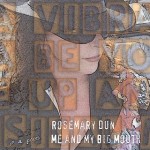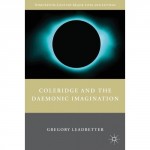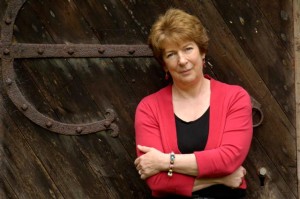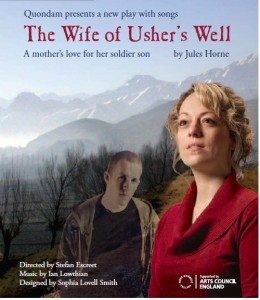 Rosemary Dun, Bristol poet, MC and stand-up, will be performing live at Hay-on-Wye Globe Field Stage on Wednesday 1st June at 2.30 pm. Here is the link to the programme:
Rosemary Dun, Bristol poet, MC and stand-up, will be performing live at Hay-on-Wye Globe Field Stage on Wednesday 1st June at 2.30 pm. Here is the link to the programme:
http://www.howthelightgetsin.org/2011-programme/globe-field/
 Rosemary Dun, Bristol poet, MC and stand-up, will be performing live at Hay-on-Wye Globe Field Stage on Wednesday 1st June at 2.30 pm. Here is the link to the programme:
Rosemary Dun, Bristol poet, MC and stand-up, will be performing live at Hay-on-Wye Globe Field Stage on Wednesday 1st June at 2.30 pm. Here is the link to the programme:
http://www.howthelightgetsin.org/2011-programme/globe-field/
 My new book, Coleridge and the Daemonic Imagination, has just been published by Palgrave Macmillan.
My new book, Coleridge and the Daemonic Imagination, has just been published by Palgrave Macmillan.
It is a new reading of Coleridge, and through the exposition of his work considers fundamental questions of poetry, spirituality, and human consciousness.
Here is the Amazon link: http://www.amazon.co.uk/Coleridge-Daemonic-Imagination-Nineteenth-Century/dp/0230103219/ref=ntt_at_ep_dpt_1
With my best wishes, Gregory Leadbetter
The way that BBC Radio 4 works is that you send in an idea, jumping through about 356 hoops while you do so. Then you wait and wait and at some point you might hear that your idea has gotten through the first round and you now have to develop it into a two page synopsis. You do so and then submit it, and wait. And wait and wait. Then two things might happen. Either you hear your play has been rejected for not being ‘distinctive enough’ or ‘aurally interesting enough’ (one day somebody is going to do the audio version of Deep Throat – I’ll give them ‘aurally interesting’) Or you might get a commission. Very occasionally the third thing happens. Nothing. Your producer occasionally emails to apologise and explain that the commissioning editor has gone somewhere else or relocated or died and somebody else is having to make a decision. By this point you’ve forgotten the title of your play and that you even submitted it in the first place.  So when my producer contacted me to say a play I’d submitted eighteen months ago had been commissioned, my first response was, ‘What play?’ I had to go away and look at my notes. But it has been commissioned – it’s on next year and I have to get a draft in by September 5th. It’s about a disastrous school trip in the seventies featuring my old PE teacher who was always telling us he had been in the SAS but held a compass the wrong way up and got us lost. It’s possibly libellous but I’ll worry about that later. And it’s got rude words in it which means a fight with the BBC Legal department. But hey – it’s a commission!
So when my producer contacted me to say a play I’d submitted eighteen months ago had been commissioned, my first response was, ‘What play?’ I had to go away and look at my notes. But it has been commissioned – it’s on next year and I have to get a draft in by September 5th. It’s about a disastrous school trip in the seventies featuring my old PE teacher who was always telling us he had been in the SAS but held a compass the wrong way up and got us lost. It’s possibly libellous but I’ll worry about that later. And it’s got rude words in it which means a fight with the BBC Legal department. But hey – it’s a commission!
I first fell in love with Katherine Mansfield as a teenager, when I found an edition of her Journals in a second hand book shop in the Charing Cross Road. Like her, I had gone to London to try to be a writer and, also like her, found out that it wasn’t at all straight forward. Later I read everything she’d ever written, fascinated by her short, tragic life and the mysteries (what did happen to the child she had in Germany?) that were never explained. 
So, in 2000 when my publisher asked ‘What are you going to do next?’ I answered ‘Katherine Mansfield’. It was the beginning of a crazy journey through Europe to New Zealand and back, through archives and family papers hoarded in the attic, through censuses and birth records, in search of answers. I lost my original publisher to the economic upheaval and my agent to maternity leave. At one point, I thought the book would never be written at all.
But it’s all been worth while, and I’ve benefited from the fact that Katherine Mansfield’s letters and journals have been transcribed and published in the last ten years, and all her husband’s papers are now in the public domain. I was also lucky enough to be allowed access to private family documents that no other biographer had ever seen. That’s every biographer’s dream!
But although the research went well, the structure of the book caused me a lot of problems. I wanted to tell the story of her husband – John Middleton Murry’s – life after she died and describe how Katherine haunted his three subsequent marriages like du Maurier’s Rebecca. And I needed to show how Murry handled her huge legacy of unpublished manuscripts and constructed a reputation for her after her death – the Mansfield Myth. But I knew that once Katherine had died, a lot of her fans might stop reading and the book would lose momentum because it’s main focus had gone. So I decided to tell Murry’s life story in parallel with hers in interwoven sections using fictional techniques.
The next controversial decision was to tell Katherine’s story in the present tense – I hate that authorial biographer’s voice, all knowing, judgmental, making pronouncements with all the benefit of hindsight. We don’t live our lives with hindsight, we live it moment to moment and make – often stupid – decisions, based on the information we have at the time. So I told Katherine’s story in the present tense, which helped me to use her letters and dairies seamlessly – telling as much as I could in her own words. The Murry sections are in the past tense, in traditional biography mode, which allowed me all the authorial comment I needed and which the present tense doesn’t allow.
The other decision I made was to have a circular structure. Katherine’s death is the one thing that people seem to remember about her life – running up the staircase at Fontainebleau to collapse at the top with a tubercular haemorrhage. I realised that everyone would be reading through the book waiting for that scene, so I decided to have her death at the beginning, which then allowed me to morph quite naturally in the second chapter into her husband’s life and the handling of her legacy. At the end of the biography, it allowed me to finish the story optimistically with her work, which did go on after her death. The reader can then, if they wish, go back to the first chapter and read it again.
Experimental technique in biography is a considerable risk – not every reviewer has liked it, but I’ve been flooded with emails from ordinary readers and academics telling me that it has illuminated Katherine’s life for them and given them a greater understanding of the context of her work.
Kathleen Jones (2010) Katherine Mansfield: The Story-Teller, Edinburgh University Press & Penguin NZ.
Tuesday 22nd March
Today is proving itself a vivid illustration of how mixed my working life has become. I find myself moderating an Open University forum on ‘graduateness’ and how best to enhance it, at (more or less) the same time as I ponder the fact that the next issue of Northwords Now is due to be printed in a few hours. Then a letter flops on to the doormat downstairs and I open to it find that the lovely people at New Writing Scotland wish to publish a poem of mine. So my poor old brain is now trying to juggle
a/ the need for the Open University to enhance collaborative learning in on-line environments
b/ the fear that I haven’t sorted all the typographical gremlins and 7,000 copies of a leading literary magazine are about to bear witness to my carelessness
c/ the strange and beautiful juxtaposition of beached boats and a graveyard on Skye.
I think I need some coffee.
(By the way, the poem is about the boats and the graves rather than virtual classrooms or misspelling the name of acclaimed novelists)
Sarah Bakewell, associate lecturer for Creative writing (A215), was announced the winner of the 2011 Duff Cooper Prize on 22 February.
Critically acclaimed, her biography of Montaigne, How to Live: A life of Montaigne, was previously one of only three shortlisted for the Costa Biography Book Award 2010.
How To Live: A life of Montaigne is the first full life of Montaigne in English for nearly 50 years, and is not a straightforward biography in the traditional sense.
Sarah relates the story of his life by way of the questions he posed and the answers he explored. It traces his bizarre upbringing (when he was made to speak only Latin), youthful career and sexual adventures, his travels, and his friendships with the scholar and poet Etienne de La Boetie and with his adopted ‘daughter’, Marie de Gournay.
The Duff Cooper Prize was named for Duff Cooper, First Lord of the Admiralty and wartime British Ambassador to France, made 1st Viscount Norwich shortly before his death in 1954. It celebrates the best in non-fiction writing, with the first annual prize being awarded in 1956. Previous winners include Robert Service, William Dalrymple, Peter Hennessy, Seamus Heaney and John Betjeman.
Sarah teaches for the Arts Faculty in London, where she also teaches for City University. A podcast in which Sarah talks to OU philosophy lecturer Nigel Warburton about her book can be accessed here: http://philosophybites.com/2011/03/sarah-bakewell-on-michel-de-montaigne.html
 Write a play with songs, for a cast of four actor-musicians – that was the brief from Penrith’s rural touring company, Quondam. I’d only written one song lyric in my life, and loved it! So I was kicking keen to work with a composer again. Also: write something entertaining for an audience that doesn’t go to the theatre that often. An interval so the audience can get together for a blether. Oh, and it has to be fun for the actors. So a cinch, really…
Write a play with songs, for a cast of four actor-musicians – that was the brief from Penrith’s rural touring company, Quondam. I’d only written one song lyric in my life, and loved it! So I was kicking keen to work with a composer again. Also: write something entertaining for an audience that doesn’t go to the theatre that often. An interval so the audience can get together for a blether. Oh, and it has to be fun for the actors. So a cinch, really…
Listen to The Bottle Song – a duet between a woman and a champagne bottle.
Writing a play is mighty hard work, even with a brilliant dramaturg and director behind you (thanks, Stefan!). You spend a lot of time talking to yourself, usually in several voices. When things aren’t working, the best strategy is to leap to your feet and feel the moment from within – a sort of method writing, I suppose. Then into the other character, see what they’re up to. You’ll gather that madness is never very far away.
But it all pays off when you go into rehearsal. From then on, it’s all about teamwork – sorting the bits that don’t work, adding new bits that do… Everyone pitches in with ideas. The whole piece has to unfold properly in time, with the right tensions and turns and surprises, and that’s hard to get a full sense of when you’re writing on your own. Then it’s on its feet, scripts go down, and everything starts coming properly alive. At some point (horribly late), you realise the play’s not yours anymore. It belongs to the actors. And you shuffle off, feeling sort of redundant, and a bit jealous. You kick a few lampposts. Finally, Helen, Danny, Andrew and Ruth take to the road in a van – the amorphous cargo of words, planks, paint and bodies that is a play. And 26 venues later, it evaporates to the wind.
Songwriting was fab! Not least because I had the chance to work with very fine accordionist, Ian Lowthian.
Lyrics are like puzzles, I found. First, you have to work out why they’re there – what’s the dramatic point? What’s the moment about? What changes? They have to be in character, with a point of view (or two), in singable language, with a pattern that can be set to music. Keep it simple, but avoid cliché. For writers, this is hard-core multiskilling – drama, story, character, rhythm, economy, music. Bring it on! You know it’s working when the audience cry.
Fast-forward: I’m working on the next brief. Two acts, interval , only three actors this time (cutbacks). And this time, it has to be a comedy. Bit of a cinch, then…
The Wife of Usher’s Well by Jules Horne toured the UK in October-November 2010. Jules is based in the Scottish Borders and teaches for the Open University in Scotland. She’s currently writing a play for BBC Radio 4.
http://www.quondam.org.uk/national-touring.cfm
www.texthouse.net
My first collection Ghosts of a Low Moon (ISBN 978-1-907276-60-6) is now available from Lapwing, Belfast at www.lapwingpoetry.com. The collection brings together new poetry and poems from magazines, such as, Ambit, The London Magazine and Interpreter’s House. The collection also features the poem, Why Guns Will Never Be Legal in England, heard on BBC Radio 4’s 2010 National Poetry Day edition of Poetry Please. A planned e-tour and readings will take place during 2011. The e-tour kicks off on my website www.andrewoldham.co.uk from February 2011, moving onto blogs in the UK, USA and the rest of the world. From June 2011 I will be touring with the poet, Ian Parks, celebrating Lapwing poets across the UK. The dates of this tour will be released in spring 2011. To celebrate the release of the collection I’m offering signed copies to buy at: http://www.andrewoldham.co.uk/Shop_AndrewOldham.htm. If you want to learn more about the collection or have a venue in the UK for poets, contact me at [email protected]. ‘Ghosts of a Low Moon captures a mixture of lyricism and damage which is a key note of the collection. I was struck by the different kinds of emotional hauntings in the book: childhood, lost loves, places and landscapes are all capable of returning to disturb the narrators of the poems…There’s a kind of damaged romanticism which underpins the vision of the book’ – Esther Morgan
The Craft of Fiction: How to become a novelist
by Jonathan Falla
I’ve been a professional author for thirty years, writing film and stage drama, three published novels, short stories and essays. The Craft of Fiction grew out of the St Andrews University summer school, of which I’m the teaching director. The school runs for a month, providing a thorough introduction to the skills of fiction.
The book covers all the essential topics: narrative structure, character and conflict, plotting and dialogue, landscape and interior description, editing… and so on. There are numerous exercises, with examples ranging from the 14th century to the 21st, including novels, narrative poems, film… even painting. My emphasis is on strong narrative, in which every aspect of the writing contributes to the drive of the story – such that even a delicate, meditative tale can be a compelling read.
Even if you are not actually writing, I hope you’ll find the book of interest as a study of how a professional novelist approaches his work.
For details, please see:
www.jonathanfalla.co.uk – my own website
www.studymates.co.uk – the publishers of The Craft of Fiction
www.st-andrews.ac.uk – for a look at the Creative Writing Summer Programme.
I’m two issues into editing Northwords Now and the time has come to start myself a ‘blog’. This is something I promised myself (and others) back In January. The good folk at The Open University (one of my other employers – God bless ‘em all!) have now provided me with a way into the blogosphere so there’s no excuse.
Where to start? I have a hunch that enough words have been expended on descriptions of snow and ice of late, so that’s out of the question. There are funding applications that need writing, but making such things ‘blog-sexy’ (does this term exist?) is too much of a challenge. So let’s begin with St Kilda.
I have never been to St Kilda, though I’d like to. I know it’s the outermost of the Outer Hebrides, home to vast number of birds (as well as sheep and the genetically distinct St Kildan mouse). I also know that the last indigenous St Kildans left in the 1930s, when illness and poverty and the dwindling population finally put paid to the community. But, like a lot of folk, I find it hard to separate knowledge from myth when it comes to St Kilda. It’s too easy to romanticise not only St Kilda as remnant of unspoilt wilderness, but also St Kilda as the last vestige of a bygone self-sufficient pre-modern way of life. That why I’ve decided Northwords Now Spring issue is going to make a bit of a fuss about St Kilda. I don’t want to put a hatchet to the myth – the way we think about places will always as much to the imagination as it does to ‘objective’ history. But I do want to refresh our vision of St Kilda, to make sure that the ‘romance’ of place doesn’t become a timeworn cliché. With this in mind, I’ve persuaded Ian Stephen and John A Love to write about St Kilda from the vantage point of now. Ian will brings the art of the story-teller and poet to the experience of place; John’s time with Scottish Natural Heritage as Area Officer for the Hebrides (as well as his gifts as a nature writer) mean that what he doesn’t know about the wildlife of St Kilda probably isn’t worth knowing. Actually it probably is worth knowing; scientists and writers know there is never an end to understanding.
All I need to do is start searching around for pictures to accompany the words. I have to admit that this feels more like play than work. For the cover issue of 16 I came across a wonderful 1930s painting by David Cameron (not the prime minister) of the mountains of Assynt. For issue 17 I’d like to feature work by a current artist. I’ve already found a few on the net but I’ll be scouring gallery websites for a while yet. I suppose there’s a certain incongruity here – I’m sitting in a centrally heated 1970s house, staring at a computer screen for digital images of a place where, until very recently, a three point plug would have seemed bizarrely out of place. I guess that’s the nature of much modern life. Our fingers skim over keyboards, our eyes flit across screens, while all the time out heads may be full of nothing but wind and rain, sea and rock.